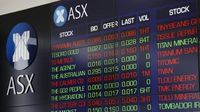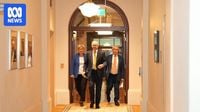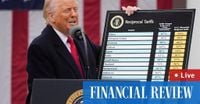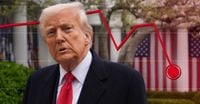In a significant escalation of trade tensions, Australian Prime Minister Anthony Albanese has threatened to invoke "dispute resolution" powers in the country’s free trade agreement with the United States, following the announcement of a 10 percent tariff on Australian exports by U.S. President Donald Trump. This tariff, described by Albanese as "unwarranted," is part of a broader strategy by the Trump administration to impose sweeping tariffs on imports from various countries, which the president has dubbed "Liberation Day."
On April 2, 2025, the ABC reported that the Albanese government is preparing to lodge a complaint with the World Trade Organization, claiming that the U.S. has breached their trade agreement. In a statement, Albanese expressed concern over the implications of the U.S. tariffs, stating, "The Australian people have every right to view this action by the Trump administration as undermining our free and fair trading relationship." He emphasized the importance of resolving the issue without resorting to dispute mechanisms, although he is prepared to do so if necessary.
Trump's administration has characterized these tariffs as "reciprocal" measures in response to trade barriers, particularly targeting Australia's biosecurity laws, which they claim restrict U.S. exports of beef, pork, and poultry. In a recent address, Trump remarked, "We imported $3 billion of Australian beef from them just last year alone. They won't take any of our beef." This statement underscores the contentious nature of the trade relationship, as it highlights the U.S. grievances regarding Australian import policies.
In response to the tariffs, Albanese announced a suite of measures aimed at supporting affected industries. This includes $50 million in emergency funding, a strengthening of anti-dumping rules, and the establishment of a new "economic resilience program" that offers $1 billion in zero-interest loans to help develop new export opportunities. Albanese reiterated that Australia would not compromise its biosecurity laws or engage in a "race to the bottom" by imposing retaliatory tariffs.
Despite the immediate impact of the tariffs, which apply to a range of Australian goods including beef, the Prime Minister noted that only 5 percent of Australia’s exports are directed to the U.S., suggesting that the direct economic consequences may be limited. However, the broader implications of a potential global trade war could pose more significant challenges, as Treasury officials have warned of indirect impacts that could affect future economic growth.
Opposition Leader Peter Dutton criticized the Trump administration's approach, stating that Australia’s special relationship with the U.S. has not been respected. Dutton argued that he could have achieved a better outcome for Australia, citing his previous connections with the Trump administration during his time in government. However, he also agreed with Albanese that certain laws, including media and biosecurity regulations, should remain non-negotiable.
As the Australian sharemarket reacted to the tariff announcement, it experienced a significant downturn, with estimates suggesting a loss of $50 billion to $60 billion in value. The S&P/ASX200 index fell by 1.41 percent, while the broader All Ordinaries dropped by 1.90 percent. Market analysts have indicated that the tariffs could lead to a shift in monetary policy, with expectations of a rate cut from the Reserve Bank of Australia (RBA) in response to the economic fallout.
In the medical device sector, companies like Cochlear and Resmed are bracing for potential cost increases due to the tariffs. Although Australian pharmaceutical companies expect to remain exempt, analysts caution that medical device manufacturers could face higher costs. Cochlear, which produces a significant portion of its products domestically, is awaiting clarification on how the tariffs will affect its exports to the U.S.
Despite the uncertainty surrounding the tariffs, the Red Meat Advisory Council has confirmed that there will be no ban on Australian beef exports to the U.S., although they will be subject to the new tariffs. RMAC chair John McKillop expressed disappointment over the tariff announcement, noting the importance of Australian red meat in stabilizing food supplies and prices in the U.S.
Albanese's government is committed to defending Australian interests amid these challenges, with plans to prioritize local businesses in government procurement and to explore new markets for Australian products. The Prime Minister stated, "Our government will always stand up for Australian jobs, Australian industry, Australian consumers and Australian values."
As the situation develops, the Australian government remains vigilant, preparing to engage with U.S. officials to seek a resolution that upholds the principles of free trade and mutual respect between the two nations. With the potential for further escalation in trade tensions, both governments will need to navigate this complex landscape carefully to avoid a broader economic fallout.








